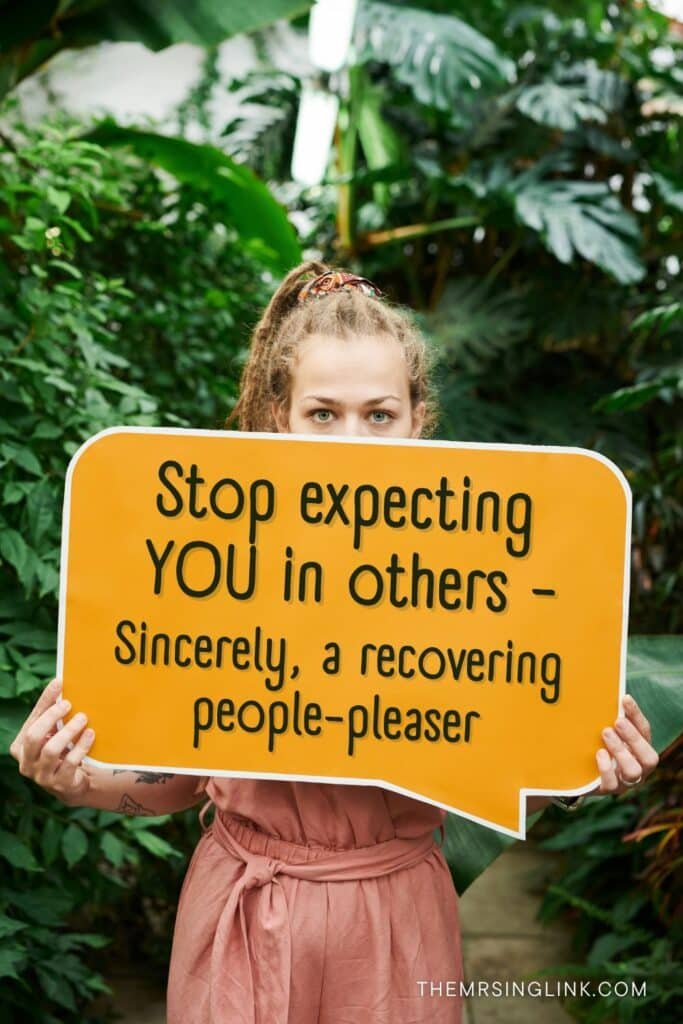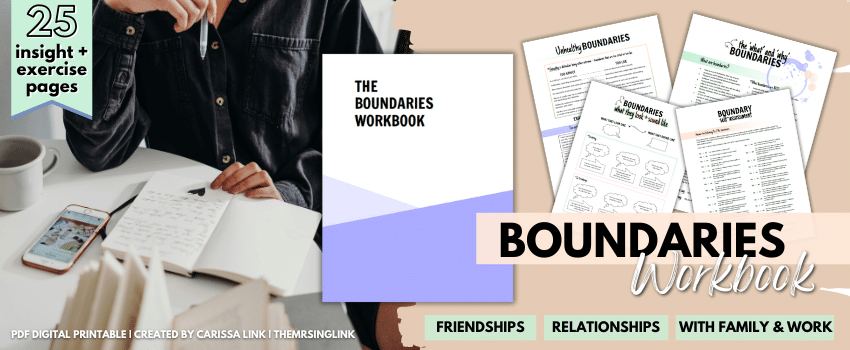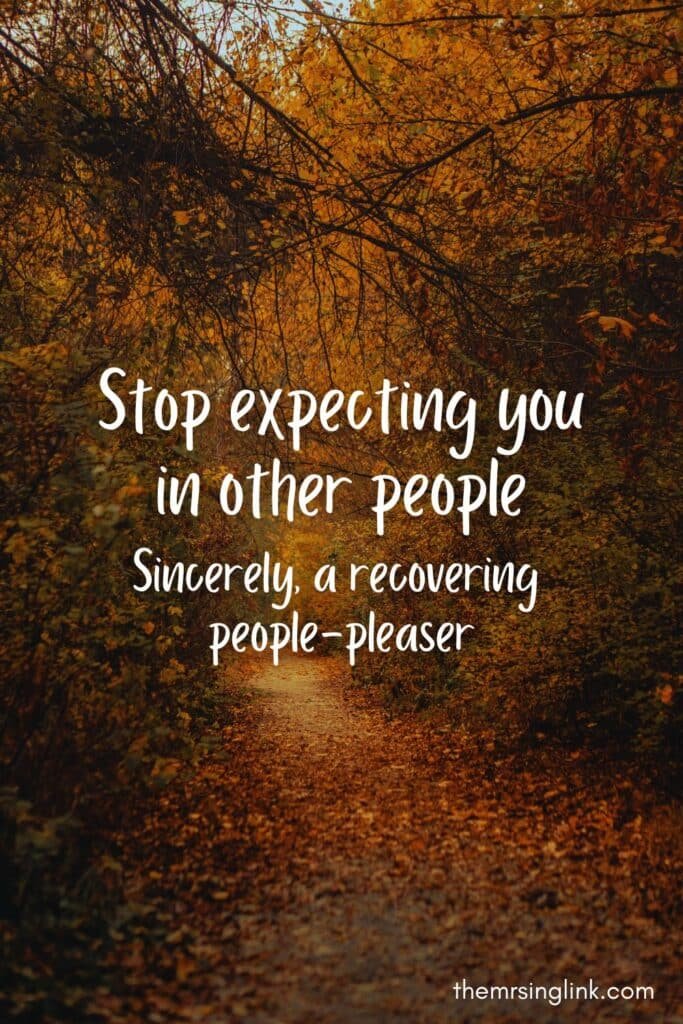Stop expecting YOU from others – sincerely, a recovering people pleaser. There’s a slightly nasty, yet logical part of me that thinks we do this because we are constantly told we are imperfectly perfect, and to focus on our positive qualities. So we start looking for that same sense of perfection in others – meaning, we’re looking for that good in others to measure up to our own perceived goodness.
And when we don’t get it, well, we’re left disappointed. Bitter. Resentful. At the end of the day, this is all very self-focused.
I know you’ve been there the same as I have. “People suck. Why is it so hard to find others who are [as]…compassionate…loving…understanding…hardworking…etc. [as *I* am]?“
But what exactly makes up a good, genuine, and decent human being? Pretty subjective qualities like kindness, respect, compassionate, and giving. By subjective, I mean that we forget that those qualities look different per individual. So what I think is respectful may be rude to someone else. For instance, I’m processing what a friend is telling me without interrupting them while they speak – I’m being respectful. To them, I’m rude for being quiet, which seems like I’m not *engaged* in what they’re saying, and for not *chiming in* according to their timely manner.
Growing up I was reiterated of who I shouldn’t be more than accepting the person I am regardless of what others think. I was also told that I can change who I am “to who I wanted to be“, though it was worded in the manner that says “I should change to who others want me to be“. That if I am more [like this] or [that way]….I was unloving, and ultimately would be unloved. There was more focus on the aspects of myself that are unloving/unloved over simply being loved for who I was/am.
You could say, at a very early, vulnerable age I learned unconditional Love – by *man’s* definition – was a complete farse. Love is conditional, and transactional, because people define what is considered loving differently (subjectively), and we’re more or only inclined to give it when we get it. People have perverted Love, plain and simple. This then, somehow, formulated my belief that it was fully within my *control* – in fact, it was my responsibility – to be what is considered loving to others as to avoid being unloved at all costs.
The big takeaway, and a conscious mistake we make in this life, is understanding how expecting to see ourselves in other people can have such a negative impact on our mental health, the way we connect with others, the true meaning of Love, and our overall happiness. Because if you live your life based on your expectations of others, you will live a slow, painful death.

Stop expecting YOU from others – sincerely, a recovering people pleaser
Stop expecting others to fulfill you or make you whole
There isn’t anyone on this earth who *knows* you best, which means no one else is responsible for your fulfillment and happiness in life. No one is THAT attuned to your needs, wants, desires and fulfillment, because only you know that one minute you need water because you’re thirsty and the next that you want to go shopping because you’re looking for a dopamine hit.
Besides, it’s just like they say: money can’t buy happiness. Stability may be one thing, luxuries are another. Remember, some of the *richest* people in the world are still the unhappiest and most unfulfilled…regardless of financial security, stability, privilege, material possession, their social connections or relationships.
Stop expecting others to agree with or understand you
Personally, I don’t believe our purpose in life is to convert, belittle, invalidate, demonize, change or eradicate everyone’s opinions, beliefs, or way of thinking. At least not coercively, forcefully, or shamefully. I also don’t believe it’s a life goal, purpose or flex to understand everything and everyone or to *know it all*.
Growing up, I wasn’t exactly encouraged to form my own opinions and beliefs about something – as an imaginative and creative person at heart, this was VERY difficult to manage. So now into my adult life, my way of thinking has been rocky, unstable, and brittle in a very black and white extremist society. I easily merge and conform to others, especially if they fail to understand or oppose my POV
As a recovering people-pleaser, I easily tend to notice how we expect ourselves in others simply when we treat others a certain, different way for not mirroring our thoughts, beliefs, opinions and values.
That said, I really do feel it’s more important to find that balance in sharing truth in Love while also giving others the space to exist and have their own mind. To do that means accepting that others won’t always agree or understand you. Yet we often berate people for even having a slightly different preference or experience, as if they’re somehow an outsider from humanity, and we allow this to dictate and determine the way or whether we connect with others.
So the goal of trying to make people understand and think the same as you is just another way of conforming to groupthink. It’s also a complete waste of energy. As a recovering people pleaser, I would know.
[pt_view id=”23d21e0pc0″]
Stop expecting others to pick up what you throw down
People come and go or stay throughout our lives. They are there to help support, guide, motivate and encourage us. And we’ve all been there – leaning on self-sabotaging behavior as a way to be taken care of, lent a hand, or offered support.
We’ve got to be more mindful of when we’re guilty of using people as vessels for our needs.
While I believe we are wired to connect with others by depending and leaning on them for support, I can’t help but notice the opposite occurring. People are depending less on others as a way to connect and instead are programmatically using others for self-gain, then are left wondering why their relationships are baseless and surface-level.
Vice versa applies here, too. We also need to be more mindful of when we’re guilty of over-giving with a reciprocal expectation from others.
Stop expecting others to like, love and respect you
You know that saying, “The way you treat others is a reflection of how you treat yourself,”? Well, from a people pleasers perspective, I whole-heartedly believed that by wanting everyone to like, love and respect me I was ultimately reflecting that to myself. That’s a big nope.
I was actually painting the perfect picture of self-hatred. I couldn’t fathom the idea of being disliked without it being a direct affliction to who I am and how I felt about myself. Hence why it’s in my bones to avoid tension, conflict and confrontation – I want to always do what’s necessary to feel good about myself and who I am to others. Yikesssssssss.
The question is always, “How do we learn and practice accepting being disliked?” I may not have all the answers but, for me, getting more comfortable with rejection, accepting that not liking everything about myself doesn’t equate to self-hatred, and sitting with the discomfort of others not liking things about me instead of controlling it is the gentlest approach.
This does not mean I am unlikeable, unlovable and unworthy. It also doesn’t mean I must/have to change in order to be likeable, lovable and worthy, either.
It’s a very slow process of managing and embracing the discomfort behind this truth: I am not for everyone, and that’s *okay*. The process has also helped me to sit with the fact that I am not responsible for fixing how others feel, and that being Loving is allowing others to experience their feelings (good and bad) rather than to trying to control them.
This is why we are encouraged to surround ourselves with the right people rather than expending the energy trying to fit a square into a circular hole. This goes without saying that we shouldn’t get bent out of shape when we are faced with that obstacle.

Stop expecting others to change
Or to be accountable, to be the bigger person or to take the blame. You cannot make someone *be* anything, more or less of something, and especially not the ideal or potential of them you wish to see. Unfortunately, I thought that by focusing on pleasing others I would [make them happy, change them, control how they felt about or behaved toward me, keep them from noticing my flaws, feel better about myself, feel worthy of Love, etc.].
We expect people to change and will wait around miserably for it because this has become conditioned as an act of Love. On the flip side, we’ll often abandon, admonish or demonize others when they don’t change (like we expected).
Change is a very personal and individual matter. It is a self-choice. And when change is genuine it will occur not because you want it to, believe you are right, or think you know what is best. The other person has to want to change and see the value in it on their own, whether it is for something, someone or not.
So when there are things you want to change about someone, it’s because you are seeking access to something not within your control. The only person you can ultimately control and change is you. And as a people-pleaser, I’ve learned the hard way that constantly appeasing my way to see change in others is a No Outlet road.
Stop expecting an apology, closure or forgiveness
Because the hard truth is… you won’t always get it. BUT, this shouldn’t mean we are to refrain from giving it.
We’re convinced we need it to move on, to feel better about ourselves or to reconcile how we feel toward the person. We’d really prefer not to despise them or live with bitterness in our hearts (eating us alive) for the rest of our lives. Right?
Well, you don’t need “I’m sorry,” or “I forgive you,” to move on and be happy. You don’t need closure to move on because no one is standing in your way from shutting that door yourself, and you don’t need to wait on them to do so. Otherwise what you’re saying is that person ultimately holds the power to continue hurting you. In fact, I’d argue you are giving them that power.
You ALWAYS have the key to remove the chains that weigh and hold you down, even if they were put there by others. As a people-pleaser, I genuinely thought I deserved the chains and that the only way of removing them was to earn the key (from others) through an apology, closure and forgiveness.
Stop expecting others to just *be happy*
You’re driving along, minding your own business, and there’s that one person that cuts you off, swerving across three lanes of traffic, slams on their brakes and beeps at the car in front of them for driving too slow. In the streamline of curse words to calm yourself, you are also probably thinking, “Dude, be chill.“
Sure, what this person did was likely uncalled for and unnecessary, and this being a light example, but at the same time you weren’t taking into consideration that they might have been dealing with a life emergency (even if that is to race to the nearest restroom) or had a bad day.
Without even realizing it we consciously assume, dismiss and invalidate the way people are truly feeling all.the.time. Everyone has their own internal struggles, yet we always expect to see people’s light be reflected toward us. Sure, I agree we shouldn’t be quickly angered or offended, and that we ought to practice gratefulness (in good times and bad), but I’m also saying we often tread through life expecting others to *just be happy* 24/7.
It’s really not that hard to be happy, even when you’re not, for the sake of others. See how bad that sounds?
[pt_view id=”aaac607m3d”]
Stop expecting others to read your mind
People are always reaching for something organic. And not just food, but when it comes to their interpersonal relationships. We all want those close to us (i.e., our partner) to want to make us happy without having to ask of them, right?
That’s valid, I get that.
But expecting a connection between others to have an ever-growing, consistent flow without effort, direction, correction, expression, change or initiation is and will always be a dead-end game.
Your wants, needs and desires change on a daily basis more than you think. Besides, what you want versus need are likely two very different things. For instance, you need support from your partner yet you really want alone time to process your feelings. On top of that, your needs and wants differ from everyone else’s.
When you’re expecting others to *just know*, or to read your mind, you are potentially – er, more than likely – setting that person up to fail. So when you complain to your partner that you both never do anything fun, you are expecting your partner to read your mind, or to *just know* that you want to go on more vacations when your partner assumes they simply need to step up their date night game.
Referring back to when I said people are always reaching for the organic – this goes hand in hand with mind-readership. So when one partner has to communicate their needs and wants, they feel its fulfillment is then not organic. In order to have that organic intimacy or connection, you *first* must express, voice and communicate your needs, wants and desires…not expect your partner to blindly make assumptions by default.
Stop expecting a specific outcome, or end result
As the saying goes, “Nobody can make you feel inferior [or insert literally anything here] without your consent.” The crazy thing is, people still consent to so much negativity with the expectation of a specific outcome.
We consent to anger, hurt, offense and disappointment simply because we are expecting validation, retribution, reparation and gratification as the result.
When things don’t go our way, we expect compensation. Again, remember when I said waaaay above that I first learned Love as being conditional, or transactional? When we go above and beyond or do things for others, we by nature expect something in return. Sometimes we even expect something from nothing. This is the quickest way to disappointment.
Also, remember this saying: “The definition of insanity is doing the same thing over and over and expecting a different result.” The real question is when will we actually take this to heart?
